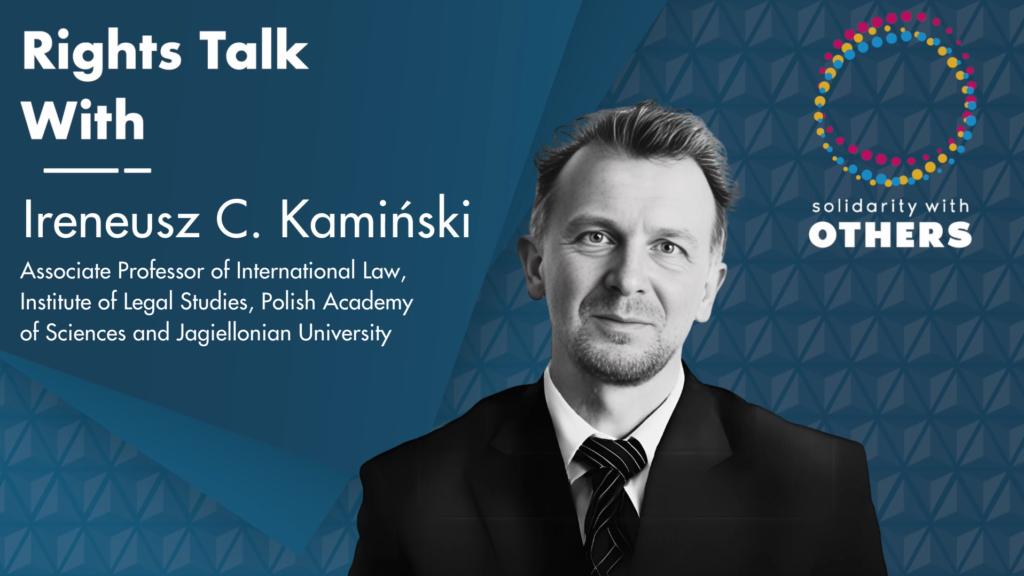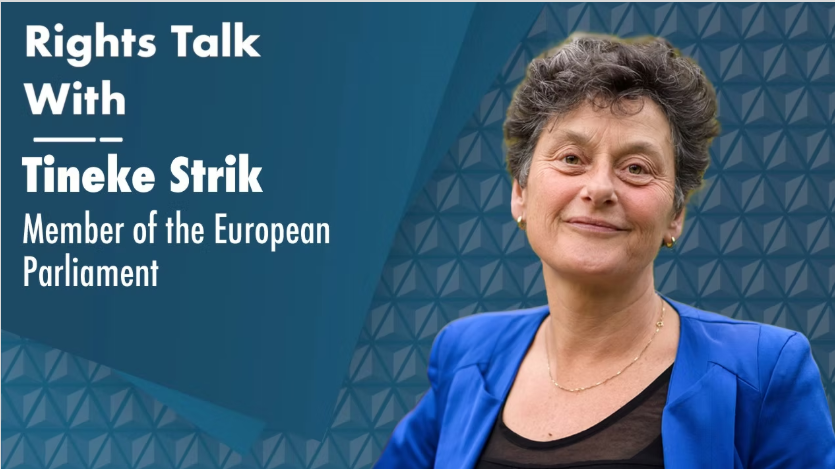Regarding your decision as a former judge of the of the ECtHR, why do you think Yalçınkaya judgement is a pivotal one?
This decision is very important because it is not a single case. It is not a separate violation of human rights that happened to Mr. Yalçınkaya. This case is representative of a huge number of repeated human rights violations. It illustrates a systemic problem with human rights application in Turkey. This means there must be a policy for implementing this judgment to meet the human rights standards applicable in this case. To give some numbers, the number of similar cases to that of Mr. Yalçınkaya pending at the Court is around 8,000.
That is a huge number of cases currently being considered by the European Court of Human Rights. Even more importantly, around 1,100 similar cases are pending at different levels in Turkish courts. Estimates say that as many as 2,000,000 people in Turkey are possibly affected by the kind of violation that happened in the case of Mr. Yalçınkaya. This indicates a huge problem present in the law application process and, of course, in the legislation applicable to similar cases in Turkey.
The Yalçınkaya decision seems to revolve around a messaging app called ByLock. Turkey is using it unlawfully as evidence. Now, what exactly is the ByLock, and how exactly did Turkey violate the convention with regards to its handling of ByLock as evidence of terrorist activity?
ByLock is an encrypted messaging application broadly and freely available to many people. It was available on different software stores, for example, Google Play. People used this application very widely. It was popular, especially in Turkey, and as far as I know, also in other countries. It was a simple encrypted software used by many individuals.
We also have other similar messaging applications, for example, WhatsApp. There is nothing criminal about having such an application on your cell phone. However, Turkish authorities considered the mere downloading of this application as sufficient evidence that the person must have been involved in illegal activities deemed very serious for public order. In other words, if a person had this application downloaded on their cell phone, they were considered to be involved in illegal activities, detrimental to public order in Turkey. These illegal activities were even considered to be of an armed terrorist nature.
This led to many cases under the Turkish penal code, more specifically, Article 314 paragraph 2, against numerous individuals. It resulted in severe persecutions and judgments against a large number of people. Mr. Yalçınkaya is only one of many affected by this legislative error and, more precisely, by its very automatic application. If a person, I repeat, had this application downloaded, it meant that this person must have been involved in illegal terrorist activities, armed terrorist groups. This had very serious consequences for many people.
Thank you. And, of course, the court found that Turkey also violated the legal principle of “no punishment without law.” How exactly did Turkey violate this particular article?
Punishment without law is one of the fundamental guarantees of human rights. This guarantee is highly ranked in the hierarchy of human rights protections and is necessary for the protection of human rights. According to the decisions of the European Court of Human Rights, Article 7, which prohibits punishment without law, is one of the key guarantees required to meet the standards of the European Convention on Human Rights. This is not a simple guarantee; it is one of the most important human rights protections under the Convention.
To explain what Article 7 is about: it prohibits punishment without national legislation. The first consequence of Article 7 is that any legislation must be formulated with sufficient precision. This means the legislation must not be vague or overly broad. It must be clear to individuals who may be prosecuted under national legislation what is prohibited and what penalties are provided for. Third, the application of this penal legislation must not be arbitrary.
In Mr. Yalçınkaya’s case, the guarantees of Article 7 were violated for several reasons. First, Article 314, paragraph 1, concerning the prohibition of terrorist activities, was applied very broadly. The national court considered that merely having the ByLock application was sufficient evidence of being part of armed terrorist organizations. No other elements of the offense were deemed necessary to meet the standards under Turkish penal law. It was sufficient that Mr. Yalçınkaya had downloaded this application for the court to conclude that he must have been part of armed terrorist activities. This led to him being sentenced to six years and three months of imprisonment, a very harsh penalty.
The European Court of Human Rights concluded that the automatic application of Turkish legislation, or relying on one simple piece of evidence without any other necessary elements, violated the principle of no punishment without law. Both objective elements (such as activities demonstrating terrorist actions) and subjective elements (such as intent) were required for this crime, and these were not sufficiently considered in Mr. Yalçınkaya’s case.
So, simply by downloading this application, it was sufficient for the National Court to conclude that Mr. Yalçınkaya must have been a member of terrorist cells. The court found that not only were the domestic laws designed in such a way that they violated the principle of no punishment without law, but also that the Turkish courts’ application of those laws violated the applicant’s right to a fair trial. Thus, it found that his right to a fair trial was also violated. Do you agree with the court’s conclusion?
I fully agree with this conclusion. Article 6 guarantees the right to a fair trial. It is very broad and offers several specific guarantees, one of which is the equality of arms between the two parties in any criminal procedure—the prosecution on one side and the accused on the other. There must be equality of arms, meaning that both sides must be treated equally by the court. This is what we lawyers call the adversarial procedure.
The European Court of Human Rights acknowledges that some limitations to access to information, especially if the information is confidential, can be compliant with human rights standards. However, any such limitations must be counterbalanced by procedural arrangements.
In Mr. Yalçınkaya’s case, he was deprived of any counterbalance measures. The Turkish courts relied on material submitted by the prosecution, which was provided by intelligence agencies, and accepted this material as reliable and fully acceptable for the procedure. Mr. Yalçınkaya did not have access to this material or even general information about its character, reliability, or how it demonstrated his involvement in criminal activities.
Even if some limitations of access to information on evidence are acceptable under the European Convention of Human Rights, there must be counterbalancing measures offered to the accused. This did not happen in Mr. Yalçınkaya’s case. Therefore, the court concluded that there was a violation of the adversarial procedure and, more generally, of the principle of equality of arms.
The court, of course, pointed out certain systemic issues related to convictions based on Turkey’s broad anti-terror laws. What sort of systemic problems have you identified?
The European Court of Human Rights pointed to a number of systemic problems. As I have already stressed, the case is not a separate, simple violation that happened accidentally or incidentally in Turkey.
This case illustrates a systemic violation, a recurring violation of human rights standards under the European Convention on Human Rights. I mentioned several cases pending both before the European Court of Human Rights and domestically in Turkey. This indicates a systematic and large-scale problem of recurring violations in Turkey.
First, there is the automatic assumption that mere possession or downloading of the ByLock application suffices to demonstrate that a given person must have been involved in illegal terrorist activities. This automatic application is in violation of the European Convention on Human Rights and represents a large-scale violation of human rights principles.
Second, the requirement of a fair trial stemming from Article 6 necessitates profound changes in Turkish judicial procedures. The issue is not with the legislation itself but with its application by Turkish courts. Several changes need to be implemented in Turkish practice, not in legislation, because the European Court of Human Rights has accepted that the legislation meets the standards of the Convention. However, the problem lies in the application of this legislation, which has resulted in large-scale violations of human rights. The case of Mr. Yalçınkaya is only one illustration of this issue.
Finally, what do you think Turkey should be doing, in order to fully comply with, the decision?
I think that the lesson offered by the European Court judgment in the Yalçınkaya case is very clear. Turkish authorities must cease automatically treating the mere use of a messaging app as sufficient evidence that a person is a member of terrorist organizations. It is necessary to ensure that the application of Turkish legislation in such cases meets all constituent elements of the offense under Article 314, paragraph 1. This means both objective and subjective elements must be present in any case pending before Turkish courts. Fully applying Turkish legislation is necessary to meet the Convention standards.
Secondly, to meet the relevant standards of a fair trial under Article 6 of the European Convention on Human Rights, any person accused under Article 314, paragraph 2 must be given the opportunity to challenge the evidence offered by the prosecution. National courts must analyze the reasons for non-disclosure of materials to the accused, and relevant counterbalancing measures must be in place to secure the right to a fair trial for any person accused under Turkish legislation. The necessary steps that must be taken in Turkey have been clearly identified in the judgment.




